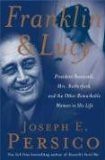Franklin and Lucy: President Roosevelt, Mrs. Rutherfurd, and the Other Remarkable Women in His Life Joseph E. Persico
On a personal level, here is my favorite passage from the book*, and the most interesting new thing I learned:
Washington in the summer was near unendurable. The heat descended as soon as the sun rose and still baked the city as night fell. In the days before air conditioning, the capital was reportedly rated a tropical post entitling diplomats to a hardship supplement.
That really has nothing to do with the book, but HOLY COW PEOPLE! IT'S HOT OUT! I'm just a poor northern girl melting away in a DC summer.
Anyway, the book. Persico has written on FDR before. This time, he turns away from politics, government, and war and instead turns to Roosevelt's personal life. Persico's main thesis is that to understand Roosevelt, you have to understand his relationships with others, particularly women.
The book focuses on key relationships-- his overbearing mother Sara, his wife Eleanor, his various mistresses, mainly Lucy Rutherford and Missy LeHand, his daughter Anna and a few other cousins. The political life, and the historical events that surround this story are all background material, mentioned in passing, always in the background.
Persico was recently given access to correspondence between Roosevelt and Lucy that was though long-missing, and that provides the backbone of his story, as well as interviews, diaries, and even other current scholarly thought.
The portrait that emerges is one of a Roosevelt who needed women to be supportive, but submissive. At the same time, we see the relationship with his wife Eleanor to be one of professional and political soul-mates who worked amazingly well together for the betterment of the country, but couldn't relate on a personal level, so they sought personal fulfillment elsewhere.
Perhaps the most complicated figure in all of this is Eleanor. Persico devotes several chapters to her relationships with others. Sometimes, it comes across almost a justification for the President's behavior-- it's ok that he has Lucy, because Eleanor has also found someone. But usually it's just shown as one more complicating factor in the lives we lead.
In the end, Persico paints a complex and deep portrait that neither condemns nor apologizes for the behavior of his subjects. At times Franklin is fighting against the odds for survival, at times he is jovial and loving, at times he is ruthless. As Persico explains in the conclusion, the reason Franklin's image survived his adulterous ways "is largely explained by the fact that revelations about his private life surfaced only after his legacy in history had been securely established. Further, the press largely left his personal life alone."*
Bybee asks, as part of the Weekly Geek challenge, to my post here, "What did you think of the FDR/Lucy biography? Was it a scholarly effort, or just salacious gossip?"
It was a scholarly effort, to the point where Persico sometimes bends over backwards to not delve into the gossipy. FYou can't write a book about love affairs without discussing whether or not the relationships had a physical aspect to them. As there is no evidence either way, Persico never says. However, he does lay out the case for both sides, often quoting historians who have gone out on a limb to state an opinion, so the reader can come up with their own conjectures. (Basically, only Roosevelt's legs were effected by the polio, so a physical relationship was medically possible, he was also an active man in his prime. But, he was also raised with strict Victorian morals, as were many of the women he was involved with so... who knows?)
*I'm reviewing from an ARC, so passages may be different from the published version.
ARC reviewed as part of LibraryThing's Early Reader's Program.


No comments:
Post a Comment